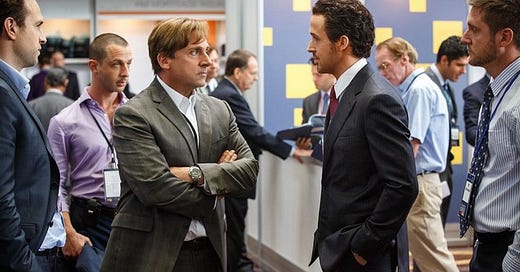The Law That Could Let Amazon Print Money
The Genius Act hands the power to create money to corporations, crypto firms, and anyone rich enough to fake a balance sheet.
I just watched The Big Short again. My third time. It’s available for free on many streaming platforms.
And it hits harder every time as a forecast. A story about people who saw a system coming apart in real time, tried to warn everyone, and were laughed at until the whole thing exploded.
Now here we are again. But this time, the bubble isn’t subprime mortgages. It’s money itself.
If the so-called Genius Act becomes law, it won’t just be a few bad loans or shady banks. It’ll be a legalized Ponzi scheme built into the foundation of the American economy. Every corporation, crypto firm, and tech startup minting its own currency.
This bill is marketed as modernization. It’s nothing of the sort.
The Genius Act is a rebrand of something we’ve tried before and abandoned for good reason. It’s the 19th-century Free Banking Era in digital drag. Back then, anyone could start a bank and print money, as long as they promised it was backed by something “real.” The result was confusion, fraud, runs, and ruin.
And that was before the internet. Before social media panic cycles. Before a globalized financial system. Before Amazon.
We are regressing. And we’re doing it in the name of freedom, efficiency, and decentralization. What we’re actually doing is opening the door to a fractured, unstable economy where trust is impossible and collapse is inevitable.
Here’s how it works.
Under the Genius Act, companies, not just banks, but companies, can issue stablecoins. These are digital currencies pegged to the U.S. dollar and supposedly backed 1:1 by “liquid assets,” like Treasury securities. WalmartCoin. AmazonCoin. Maybe even TrumpCoin. All legally sanctioned.
If the amount issued is under $10 billion, states regulate it. If it’s above that, federal regulators step in. That’s the pitch: choice, competition, innovation. In reality, it’s monetary anarchy in a suit and tie.
Because pegging a coin to the dollar only works if everyone plays by the rules and the referees are honest and competent.
We’ve seen this movie. SVB collapsed in 2023 because regulators didn’t catch the mismatched risks until depositors panicked. FTX, Terra/Luna, and other crypto implosions followed the same script: fake reserves, fake trust, and real people losing real money.
Now imagine this at scale. Hundreds or thousands of stablecoins circulating in the same economy as the dollar, each supposedly backed by safe assets, all of which are now subject to redemption risk. If even one coin issuer faces a confidence crisis, it could trigger a run on every other one. Redemptions explode. Issuers dump Treasuries to pay out. Prices collapse. Interest rates spike. Panic spreads.
You’ve just engineered a monetary system where rumors can crash the bond market.
And for what? So corporations can avoid interchange fees? So tech bros can mint their own money and pretend it’s innovation?
The U.S. dollar is powerful because it is boring. It is singular. It is central. It is backed by sovereign authority and decades of policy coherence (however flawed). It is, at minimum, the standard.
The Genius Act wants to replace that with a marketplace of mini-dollars — some regulated by New York, others by Wyoming, still others by whatever Delaware LLC was spun up last week.
When monetary authority is privatized, the lines between wealth and power disappear. Who needs lobbying when you can print your own currency?
Who needs elections when you control the means of exchange?
We don’t have to romanticize the Fed to recognize that breaking the spine of a unified currency system will shatter the economy it holds up. Letting a thousand cryptos bloom sounds poetic until you realize they’ll be traded, discounted, or rejected in checkout lines, just like banknotes in 1859.
Money works when it’s singular. Trust works when it’s consistent. A stable economy needs both. The Genius Act would obliterate them.
If The Big Short taught us anything, it’s that financial collapse doesn’t begin with explosions. It begins with silence, the kind that follows when a complex system is corrupted from within and no one wants to see it.





